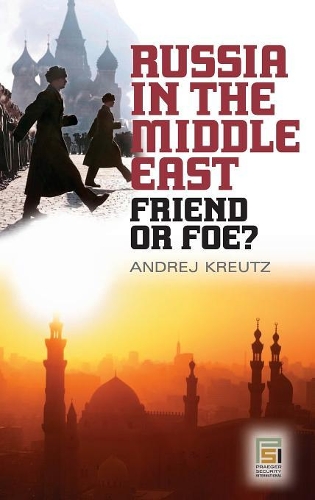
Russia in the Middle East: Friend or Foe
(Hardback)
Publishing Details
Russia in the Middle East: Friend or Foe
By (Author) Andrej Kreutz
Bloomsbury Publishing PLC
Praeger Publishers Inc
30th November 2006
United States
Classifications
General
Non Fiction
327.47056
Physical Properties
Hardback
232
Width 156mm, Height 235mm
510g
Description
Kreutz examines the goals and strategies of Russia and the former Soviet Union toward most of the Arab states in the Middle East. The author argues that Russia has been an important actor in the region for over a century and has tried to regain its influence in several countries following its strategic retreat after the collapse of the Soviet Union in the early 1990s. However, according to Kreutz, Moscow does not seek confrontation with the United States or with the West in general in the region. Rather, the Russians are interested in peace and stability in the region, which is close to its borders. Because of that, although Moscow wants to cultivate its links with Israel, it also seeks to reach a peaceful and balanced solution to the Palestinian-Israel and the Arab-Israeli conflicts, taking Palestinian and Arab interests into account. Washington can better engage Moscow as a stabilizing force in the Middle East and as a collaborator in the struggle against Islamic terrorists. At the same time, the United States must be cognizant of where Washington and Moscow diverge. Although Russia may be too weak now to compete with the United States on a global scale, it is not happy to see American or EU encroachment close to its own neighborhood. If we take their weakness for granted and become blind to the possibilities for Russian alliances in the region, we do so to our disadvantage. This book demonstrates Russia's enduring interest and influence in the Arab Middle East.
Reviews
Kreutz has written a useful book concerning Russian ties with a number of Arab countries, including Syria, Lebanon, Jordan, Egypt, Iraq, and other nations located in the Arabian Peninsula, and the Palestinians. The book contains both a historical and political examination of Russia's approach toward the Palestinian problem. Kreutz furnishes an overview of Soviet policy in the region and then discusses how Russian policy developed after the breakup of the Soviet Union. The author places significant emphasis on Russia's role in the Arab-Israeli conflict.[a] useful volume on a timely topic. Recommended. Graduate students, researchers, and faculty. * Choice *
Andrej Kreutz provides a detailed and fresh analysis of the Russian policies and motivations in that region in the past decade, updating and expanding upon the excellent scholarship of Galia Golan's Soviet Policies in the Middle East from World War Two to Gorbachev. * The International History Review *
[D]etailed and carefully researched.[t]he volume represents a worthwhile addition to the literature on Russian-Arab relations. * The Russian Review *
Kreutz analyzes post-Soviet Russian foreign policy towards Syria, Lebanon, Jordan, Israel/Palestine, Iraq, Egypt, and the Arabian Peninsula in terms of its broad historical and geopolitical framework. The major questions he wishes to address in his treatment concern the origins of Russia's objectives in the Arab East (Al- Mashreq), the impact of sociopolitical change in Russian statehood on Russian foreign policy, the basic goals and characteristics of Russian diplomacy, President Putin's particular contributions to those goals and characteristics, and the compatibility (or lack thereof) of Russian foreign policy in the region with American, Israeli, or broader Western objectives. * Reference & Research Book News *
Author Bio
Andrej Kreutz teaches political science and international relations at the University of Calgary and at Mount Royal College in Calgary, Alberta, Canada.
